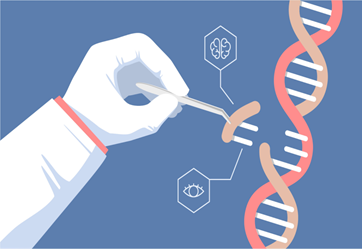CRISPR bio-technology
Context:
CRISPR technology has successfully competed 10 years, this year. In just a decade, CRISPR has become one of the most celebrated inventions in modern biology.
???About CRISPR
- CRISPR-CAS9 is a technology that allows scientists to essentially cut-and-paste DNA, raising hope of genetic fixes for disease.
- However, there are also concerns about its safety and ethics.
- CRISPR is a dynamic, versatile tool that allows us to target nearly any genomic location and potentially repair broken genes.
- It can remove, add, or alter specific DNA sequences in the genome of higher organisms.
|
India approved a 5-year project to develop CRISPR to cure sickle cell anaemia (it mainly affects tribal population) as this technology has produced flawless results in clinical trials. |
How does Gene-editing work?
- Unusual but repeated DNA structures that scientists had been observing for some time were given a name.
- This name was assigned as “Clustered regularly interspaced short palindromic repeats” or CRISPR.
- In 2012, scientists discovered that CRISPR is a key part of the “immune system”.
- For instance, when a virus enters a bacterium, it fights back by cutting up the virus’s DNA.
- This kills the virus but the bacterium stores some of the DNA.
- The next time there is an invasion, the bacterium produces an enzyme called Cas9 which matches the stored fingerprints with that of the invaders.
- If it matches, Cas9 can snip the invading DNA.
- The CRISPR-Cas9 gene-editing tool thus has two components. They are:
- A short RNA sequence that can bind to a specific target of the DNA.
- The Cas9 enzyme which acts like molecular scissors to cut the DNA.
- To edit a gene of interest, the short RNA sequence that perfectly matches with the DNA sequence that has to be edited is introduced.
- Once it binds to the DNA, the Cas9 enzyme cuts the DNA at the targeted location where the RNA sequence is bound.
- Once the DNA is cut, the natural DNA repair mechanism is utilized to add or remove genetic material or make changes to the DNA.
Advantages of Gene Editing
- CRISPR could be used to modify disease-causing genes in embryos brought to term, removing the faulty script from the genetic code of that person’s future descendants as well.
- Genome editing could potentially decrease, or even eliminate, the incidence of many serious genetic diseases, reducing human suffering worldwide.
- It might also be possible to install genes that offer lifelong protection against infection.
- CRISPR may prove useful in De-Extinction Efforts.
- For example, Researchers are using the powerful gene-editing tool to recreate the woolly mammoth.
- CRISPR Could Create New, Healthier Foods- In agricultural crops; Crispr has the potential to impact yield, disease resistance, taste, and other traits.
- Few experiments have been done. If successful it can help us to eradicate the problem of hunger and malnutrition.

